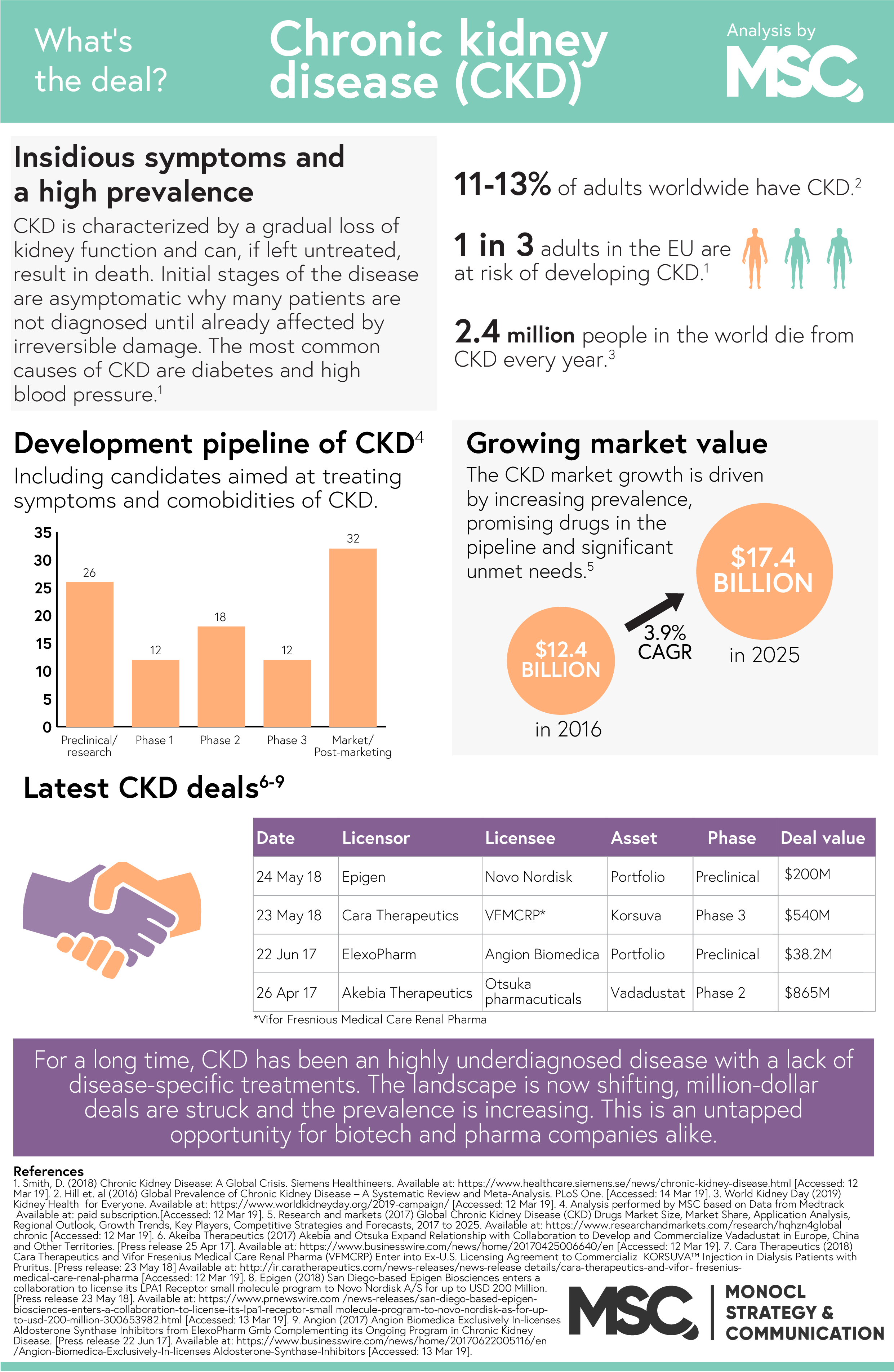Chronic Kidney Disease (CKD) is currently the 6th fastest growing cause of deaths worldwide, where every year at least 2.4 million lives fall victim of the disease. In light of 2019’s World Kidney Day on 14th March, we decided to take a look into this under diagnosed disease that has caught the attention of biotech start-ups and Big Pharma alike due to its growing market value, million dollar deals and increasing prevalence.
CKD is an insidious disease characterized by the gradual loss of kidney function over time and symptoms that only appear once the kidney’s function has already been significantly impaired. If not treated properly, CKD will progress to end-stage renal disease (ESRD), i.e. kidney failure, also known as CKD stage 5. At this stage, the only two options for survival available today is dialysis or kidney transplantation.
Rapidly growing prevalence and causes
Globally, 11-13% of adults are estimated to have CKD and, in the EU, 1 in 3 adults are estimated to be at risk of the disease. The most common causes of the disease is diabetes and high blood pressure (hypertension), but other factors, such as age, autoimmune or genetic diseases, extended use of painkillers and obesity also increases the risk of obtaining CKD.
A changing development pipeline
Right now, 88% of the marketed drugs in the CKD field are focused solely on treating the serious comorbidity of CKD, anemia, i.e. the loss of red blood cells. The development pipeline in the CKD space, however, is now shifting. Looking at candidates in Phase 2 and 3, 22 candidates out of 30 are aimed at treating either CKD or ESRD not a side effect. With today’s limited treatment options, the only choice is waiting for a kidney transplant, which in the U.S. takes an average of five years according to a national patient group, and until then, the patient is completely dependent on dialysis. The average life expectancy on dialysis is five to ten years. We’re afraid not a very bright outlook, making the possibility to provide a difference to these patients huge.
This surely demonstrates a serious interest from several big players in this under diagnosed, but growing $12.4Bn market.
Big interest from Big Pharma
For drug developers targeting CKD, it might be very interesting to know that over the last three years, deals with a total value of $1.6Bn has been struck in the field. To add to the case, several Big Pharma companies have expressed their interest in the field. AstraZeneca and Baxter are both global supporters of World kidney day and conduct research within the field. AstraZeneca describes CKD as one of their focus areas and is currently involved in the development of four drug candidates, of which two of these candidates are targeting CKD specifically. Baxter is instead focused on tools for dialysis that can improve outcomes for patients. Additionally, both Bayer and Eli Lilly have Phase 1 candidates for CKD in development. This surely demonstrates a serious interest from several big players in this under diagnosed, but growing $12.4Bn market.
The number of patients suffering from CKD is increasing every year, especially in western countries due to increasing prevalence of the risk factors, such as age, diabetes and obesity. Fortunately, the field and its patients has managed to catch the interest of pharma and biotech companies alike, motivating million-dollar deals with the potential of revolutionizing the way the disease is treated and perceived.




